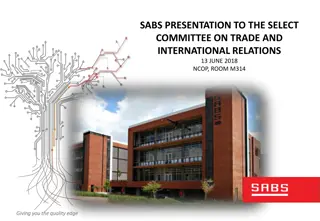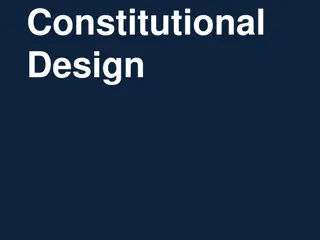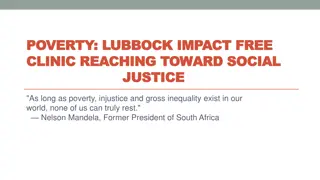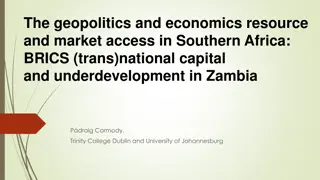The Life and Legacy of Nelson Mandela: Iconic Leader of South Africa
Nelson Mandela, the first Black president of South Africa and a key figure in the anti-apartheid movement, dedicated his life to promoting reconciliation, unity, and social justice. His steadfast resolve, commitment to justice, and vision for a society built on equality continue to inspire people worldwide. Mandela's legacy serves as a beacon of hope and a testament to the enduring power of individuals to effect positive change despite challenges. His contributions, teachings, and leadership have left an indelible mark on history and continue to resonate with people of all backgrounds.
Download Presentation

Please find below an Image/Link to download the presentation.
The content on the website is provided AS IS for your information and personal use only. It may not be sold, licensed, or shared on other websites without obtaining consent from the author. Download presentation by click this link. If you encounter any issues during the download, it is possible that the publisher has removed the file from their server.
E N D
Presentation Transcript
Welcome The life ,career and teaching of Nelson Mandela: the undisputed leader of South Africa
Introduction RaselAhmmed Lecturer of English Abeda Noor Fazil Madrasah Gallai, Chandina, Cumilla Mobile:01723491834 E mail:raselahmmed3@gmail.com
An undisputed leader was born Nelson Mandela (born July 18, 1918, Mvezo, South Africa died Johannesburg) was a Black nationalist and the first Black president of South Africa (1994 99). His negotiations in the early 1990s with South African Pres. F.W. de Klerk helped end the country s apartheid system of racial segregation and ushered in a peaceful transition to majority rule. Mandela and de Klerk were jointly awarded the Nobel Prize for Peace in 1993 for their efforts. December 5, 2013,
Nelson Mandelas contributions to the anti-apartheid movement Mandela played a pivotal role in the struggle against apartheid, advocating for nonviolent resistance initially and later embracing armed struggle as a last resort. He co-founded the militant Umkhonto we Sizwe (MK) and was arrested in 1962, spending 27 years in prison. Mandela s steadfast resolve and commitment to justice inspired millions, both domestically and internationally, amplifying the fight against apartheid and institutional racism.
promoting reconciliation and unity in post-apartheid South Africa Following his release from prison in 1990, Mandela led negotiations to dismantle apartheid multiracial elections. As South Africa s first black president, he implemented policies aimed including the Truth and Reconciliation Commission, which investigated human rights violations. Mandela s emphasis on forgiveness and unity helped prevent widespread bloodshed and fostered a peaceful transition to democracy. and establish at reconciliation,
Mandelas legacy Mandela s legacy transcends borders and resonates communities worldwide. His triumph over injustice and his vision of a society built on equality and dignity continue to inspire activists and leaders in their struggles for social justice, human rights, and democratic governance. Mandela s legacy serves as a beacon of hope and a testament to the enduring power of individuals to effect positive change, even in the most challenging circumstances. with oppressed
Some Quotes from Nelson Mandela The fight against apartheid liberated all coloureds, Indians, and whites- the struggle for gender equality will benefit both men & women. The prosperous future to which we aspire calls for a united front of all South Africans across both the colour & gender divides. South-Africans,
Some Quotes from Nelson Mandela Colonialism and apartheid have left a sharply polarized society. Until we reduce the wide gaps between educated and the illiterate, the sheltered homeless, and very rich and the poor, we will continue to be deeply divided. the and the
Nelson Mandelas Legacy: Long Walk to Freedom Long walk to Freedom , by Nelson Mandela is all about the struggle of freedom of South-Africa. On May 10, 1994, Nelson Mandela has taken the vow as the first black president of South Africa. And therefore it was becoming a new-born democratic country. Nelson Mandela took the oath as the first black president. Many dignitaries from different countries had come to be part of the most significant day. In his speech, Mandela thanked all those dignitaries. Mandela assured his countrymen that his country would never ever experience the same suppression of one by another. Democracy had been established in South Africa and as a result, a government of no discrimination was established.
Demise of Nelson Mandela Nelson Mandela died on December 5, 2013, in Johannesburg. He was 95 years old. After his death was announced, his life was remembered and celebrated in South Africa as well as around the world. Numerous memorial services were held, including one by the South African government on December 10. He was laid to rest at Qunu, in South Africa s Eastern Cape province, on December 15.























